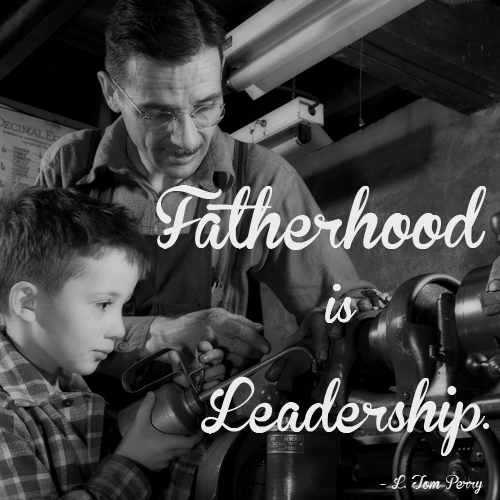A recent article in the Deseret News emphasized the importance of fathers in the lives of children. The article noted that there were 1.96 million single fathers in the United States in 2012 and only 5 percent of those were widowed. The rest were divorced or separated or had never been married to the mothers. This means a great many children are growing up without a dad in the home, some without a father in their lives at all.
 For almost four decades, studies have consistently shown that children grow up better when they have a father in the home and suffer the most when their father is not present at all and there is no other father figure. The role of the father, while not more important than the role of the mother, is essential. “…Research consistently shows that the married mother-and-father family is a better environment for raising children than the cohabitating (living together) mother-and-father family.” (See The Importance of Fathers in the Healthy Development of Children, Author(s): Office on Child Abuse and Neglect, U.S. Children’s Bureau Rosenberg, Jeffrey Wilcox, W. Bradford, Year Published: 2006.)
For almost four decades, studies have consistently shown that children grow up better when they have a father in the home and suffer the most when their father is not present at all and there is no other father figure. The role of the father, while not more important than the role of the mother, is essential. “…Research consistently shows that the married mother-and-father family is a better environment for raising children than the cohabitating (living together) mother-and-father family.” (See The Importance of Fathers in the Healthy Development of Children, Author(s): Office on Child Abuse and Neglect, U.S. Children’s Bureau Rosenberg, Jeffrey Wilcox, W. Bradford, Year Published: 2006.)
Fathers Improve Children’s Outcomes
Studies show that daughters without fathers in their lives are more likely to become pregnant as teens and to suffer from depression. A British study showed children of both genders were more likely to do well in school and to stay out of trouble if they had a father in their lives.
The article explains:
The Department of Health and Human Services summarizes a father’s vital role this way: “Involved fathers provide practical support in raising children and serve as models for their development. Children with involved, loving fathers are significantly more likely to do well in school, have healthy self-esteem, exhibit empathy and pro-social behavior compared to children who have uninvolved fathers. Committed and responsible fathering during infancy and early childhood contributes emotional security, curiosity, and math and verbal skills.”
Men and women parent differently and these differences offer children a chance to see multiple ways of handling problems and also let them see how two people work out those differences so they are on the same page. The differences in male and female parenting are designed to complement each other so the child has a more balanced childhood—mothers protect while fathers challenge, for instance.
Fathers Are Not Just Second Adults
Because there is a clear need to reassure mothers who must raise children alone, we sometimes minimize the importance a father plays in a child’s life. While it’s not always possible to have that ideal situation and many mothers do an amazing job on their own, it is still important not to translate that into a belief that fathers are non-essential, because that is not true. They do play a critical role that cannot be filled by someone else in an exact way, although others can, without question, help lessen the challenges.
Men provide a role-model for the male life and character to both their sons and their daughters. When the parents are married, they demonstrate appropriate relationships in marriage. Children who are rejected by a biological parent often struggle with self-esteem issues. In the best of all situations, children are raised by both their biological parents.
Sociologist, Dr. David Popenoe, an expert on fatherhood, is quoted in the above government report as saying, “Fathers are far more than just ‘second adults’ in the home. Involved fathers bring positive benefits to their children that no other person is as likely to bring.”
Mormons teach parents that God planned for children to have both a mother and a father, which is why He started the world with Adam and Eve. They issued a proclamation on families that clearly outlines God’s plans for families, which include a mother and a father working together as a team to raise their children.
Additional Resource:
